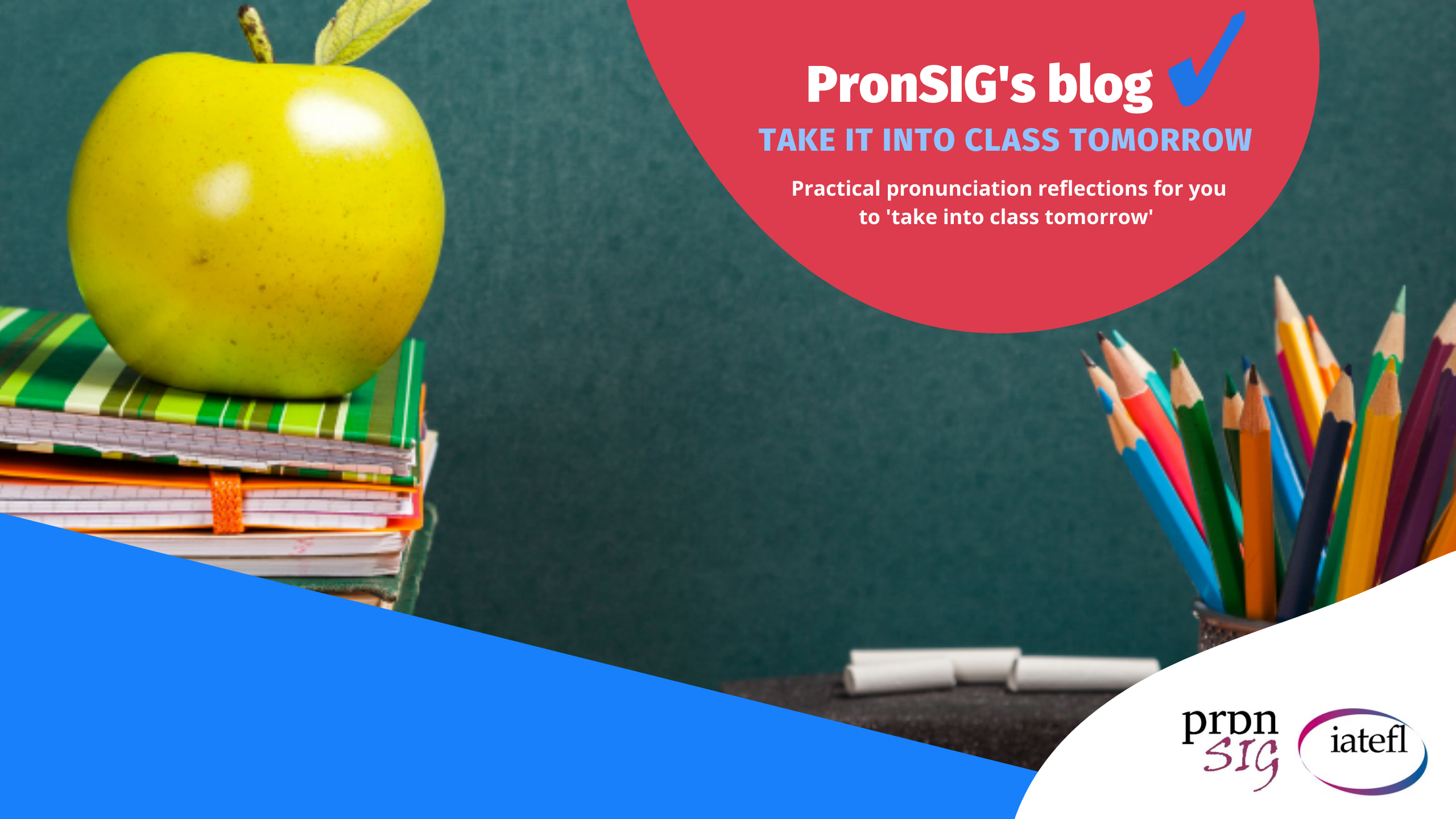By Ana Paula Biazon Rocha In the September and October blog posts, we discussed the relevance and the challenges of pronunciation assessment in reference to PronSIG’s annual conference, Exploring effective …
pronunciation
Embodied pronunciation instruction: empirical evidence and recent findings [Webinar by Florence Baills & Pilar Prieto]
Date: 19 November 2022 (Saturday) at 13:00 UK time
Key takeaways of PronSIG’s October Conference on Pronunciation Assessment
by Ana Paula Biazon Rocha PronSIG’s Conference, Exploring effective pronunciation assessment practices in the English language classroom, on 01 Oct 2022, was an extremely successful and enriching event which shed …
What pronunciation teachers can learn from international teaching assistants [Webinar by Vijay Ramjattan]
Date: 24th September 2022 (Saturday), 12:00 pm UK time
Getting ready for PronSIG’s October Conference ‘Exploring effective pronunciation assessment practices in the English language classroom’
by Ana Paula Biazon Rocha Among the “WH-issues of pronunciation instruction” (I’m coining the expression, what do you think?!), namely why, how and when to teach pronunciation and what to …
Teaching syllable structure as an effective learning tool
by Ivana Duckinoska-Mihajlovska Words with more than one syllable, polysyllabic words, can sometimes cause difficulties for learners, especially less proficient ones, when reading. They may focus on orthography, without considering …
PronSIG Online Conference 2022 [Conference Call]
We are now accepting speaker proposals for our October online conference being (1st October 2022) in collaboration with IATEFL TEASIG (the Testing, Evaluation and Assessment Special Interest Group of IATEFL).
Teaching pronunciation a little or a lot: is there a precise measurement?
by Ana Paula Biazon Rocha ‘Of all the aspects of language – vocabulary, grammar, pronunciation, spelling, the four skills and so on – pronunciation is probably the one that needs …
PronSIG Members’ Book Club
First online PronSIG Members’ Book Club meeting – for PronSIG members only!
Takeaways from our PCE event: Part 2 – Speaking and Writing
by Ivana Duckinoska-Mihajlovska PronSIG’s Pre-Conference Event (16 May), Pronunciation and the four skills, offered us a myriad of ideas and tips on how to integrate pronunciation into our lessons. At …
Getting the best out of speech technologies for pronunciation teaching [Webinar by Beata Walesiak & William Gottardi]
Date: 18th June 2022 (Saturday), 12:00 pm UK time
Takeaways from our PCE event: Part 1 – Reading and Listening
by Ivana Duckinoska-Mihajlovska This year’s PronSIG pre-conference event (16 May) catered for all tastes. Titled Pronunciation and the four skills, our first hybrid event ensured that everyone wrapped up the …
Getting to know our PCE speakers
By Ana Paula Biazon Rocha and Victor Medina Soares As the IATEFL 2022 conference in Belfast approaches (17 May-20 May), PronSIG gets ready for two amazing events: our Pre-Conference Event …
Reflecting on your own teaching of pronunciation through PronSIG’s latest webinars
By Ana Paula Biazon Rocha In February and March 2022, PronSIG’s webinars with Victor Medina, Understanding intelligibility in Pronunciation Instruction, and Anastazija Kirkova-Naskova, Research-informed pronunciation instruction: Best practice recommendations, respectively, …
Pronunciation Showcase Day [IATEFL 2022]
Join us for Pronunciation Showcase Day at IATEFL 2022 (55th International Conference & Exhibition) on Thursday, 19th May 2022!
Pronunciation and the four skills [Pre-Conference Event IATEFL 2022 (hybrid)]
Pronunciation and the four skills, PronSIG Pre-Conference Event (PCE) at IATEFL 2022, the 55th International Conference & Exhibition Date: 16th May 2022 Welcome to the IATEFL PronSIG Pre-Conference Event (PCE)! …
Research-informed pronunciation instruction: Best practice recommendations [Webinar by Anastazija Kirkova-Naskova]
Register now for PronSIG webinar with Anastazija Kirkova-Naskova,
Date: 19th March 2022 (Saturday), 12:00 pm UK time
Understanding Intelligibility in Pronunciation Instruction [Webinar by Victor Medina]
PronSIG Webinar
Date: 19th February 2022 (Saturday), 12:00 pm UK time
Sound variation and change: key takeaways of PronSIG’s webinar
by Ana Paula Biazon Rocha The first PronSIG webinar of 2022 with Thais Cristofaro Silva, ‘How does your mother tongue impact L2 learning?’, focused on answering two essential questions: 1) …
How does your mother tongue impact L2 learning? [Webinar by Thaïs Cristófaro Silva]
PronSIG Webinar
Date: 29th January 2022 (Saturday), 12:00 pm UK time
Top 6 tips on teaching intonation from Lucy Pickering’s sessions for IATEFL PronSIG
by Ana Paula Biazon Rocha On 20 November 2021, IATEFL PronSIG invited Lucy Pickering to run two sessions: Ask the Expert, where participants had the chance to ask her questions …
Ask the Expert! PronSIG invites Lucy Pickering [Free Q&A session!]
Register for a free webinar with Lucy Pickering, the author of Discourse Intonation (2018), who will talk to IATEFL Pronunciation SIG (PronSIG) and answer the participants’ questions about intonation!
Date: 20 November 2021 (Saturday), 14:00-15:00 UK time
Teaching discourse intonation in the classroom [exclusive workshop]
An exclusive 60-minute workshop with Lucy Pickering: Teaching discourse intonation in the classroom!
Date: 20 November 2021 (Saturday), 15:15-16:15 UK time
Can anyone think of the children?
In our monthly commentary, our bloggers call for more practical research and experimentation in the Early Years pronunciation classroom.
Top 6 tips for teaching pronunciation from PronSIG’s Online Conference
by Ana Paula Biazon Rocha On 02 October 2021, PronSIG’s online conference, Mind, Brain and Pronunciation: How thoughts, emotions, and experiences affect L2 English pronunciation, offered participants a myriad of …
PronSIG Online Conference 2021 videos & slides
Click here to watch PronSIG Online Conference 2021 videos and slides!
PronSIG Online Conference 2021 (2nd October 2021)
PronSIG Online Conference (2nd October 2021): Mind, Brain and Pronunciation: How thoughts, emotions, and experiences affect L2 English pronunciation
Pronunciation and Orthography: Strange Bedfellows?
Can we rely on spelling to help our learners better grasp pronunciation features of English? Explore some ideas on this subject in this post!
Friend or foe? – Orthography in pronunciation learning and teaching [Webinar by Rosane Silveira]
Date: 18th September 2021 (Saturday), 12:00 pm UK time
Reading aloud as a potential pronunciation tool for teaching thought groups
by Ivana Duckinoska-Mihajlovska Recently, we asked our social media followers if they think that reading aloud (RA) is a good pronunciation practice for students (Ss). The feedback was overwhelming with …




















